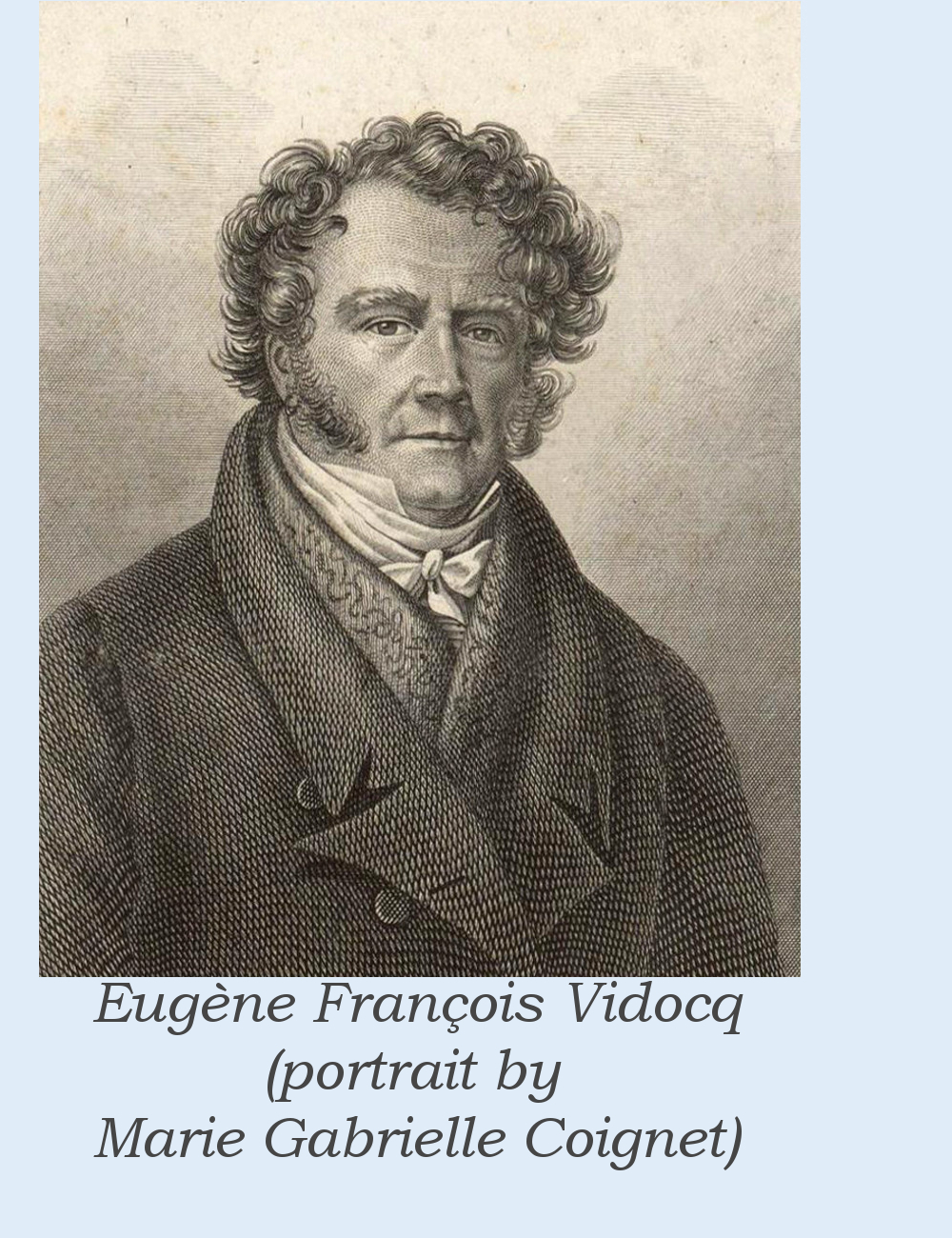
Eugène François Vidocq
 Biography
BiographyEugène-François Vidocq (July 24, 1775–May 11, 1857) was a French criminal turned criminalist whose life story inspired several writers, including Victor Hugo, Edgar Allan Poe and Honoré de Balzac. The former criminal became the founder and first director of France’s first criminal investigative agency, the Sûreté nationale, as well as the head of the first known private detective agency. Vidocq is considered to be the father of modern criminology and of the French national police force, as well as being regarded as the first private detective.
Born in Arras, northern France in the Rue du Miroir-de-Venise, nowadays the Rue Eugène-François Vidocq, he was the third child of Henriette Françoise Vidocq (maiden name Dion, 1744–1824) and her husband, the baker Nicolas Joseph François Vidocq (1744–1799). His father was well educated and, for those days, very wealthy since he was also a corn dealer. Vidocq had six siblings: two older brothers (one of whom had died before he was born), two younger brothers and two younger sisters. His teenage years were a turbulent time period. He was fearless, rowdy, and cunning, very talented but also very lazy. He spent much time in the armories (fighting halls) of Arras and acquired a reputation as a formidable fencer and the nickname le Vautrin (“wild boar”). By stealing he provided himself with some level of comfort. When he was thirteen years old he stole his parents’ silver plates and spent the proceeds from them within a day. Three days after the theft he was arrested and brought to the local jail. By age fourteen he had stolen a large amount of money from the cash box of his parents’ bakery and left for Ostend, where he tried to embark to the Americas; but he was defrauded one night and found himself suddenly penniless. To survive he worked for a group of traveling entertainers. Despite regular beatings he worked hard enough to get promoted from stable boy to playing a Caribbean cannibal who eats raw meat. He ended up living with puppeteers to get away from the entertainers, but he was banished from them because he flirted with the young wife of his employer. He then worked some time as an assistant of a peddler, but as soon as he neared Arras he returned to his parents seeking forgiveness. He was welcomed by his mother with open arms.
He joined the army, deserted to the enemy, returned, acquired a reputation as a womanizer, resulting in a number of duels for which he was eventually imprisoned. Afer years of wandering around engaging in various criminal enterprises, hiding from the police, getting arrested and escaping, he finally decided to stop living this lifestyle and offered himself as a prison informant to the police. This decision to reform was inspired by his witnessing the public execution of a fellow criminal and friend, so historians are justified in questioning the sincerity of his reformation.
As an informant he was so successful that authorities rewarded him by releasing him from prison, but he continued to ply his spying trade to such effect that he was eventually noticed by Emperor Napoleon, who on December 17, 1813, signed a decree that formed the state security police force called the Sûreté Nationale and appointed Vidocq its leader. From this point he and his fellow secret agents spied on their fellow citizens, both criminal and otherwise. On the positive side he is credited with much innovation in policing, including the introduction of undercover work, ballistics, criminology, a record keeping system specific to criminal investigation, the first plaster cast impressions of shoe prints, and an indelible ink and unalterable bond paper created by his own printing company.
Bibliography
Mémoires de Vidocq, chef de la police de Sûreté (autobiography, 1828)
Les voleurs (a study of thieves and imposters, 1836)
Dictionnaire d'Argot (1836)
Considérations sommaires sur les prisons, les bagnes et la peine de mort (deliberations on reducing crime, 1844)
Life in Paris; or, The Adventures of a Marquis (1848 English translation of the novel Les vrais mystères de Paris, 1844)
Les chauffeurs du nord (memoir of his time as a gang member, 1845)
Other links
Encyclopaedia Britannica
HeadStuff
Wikipedia